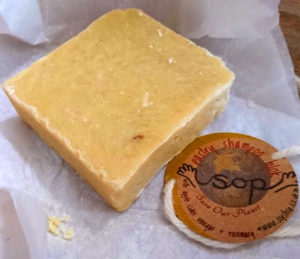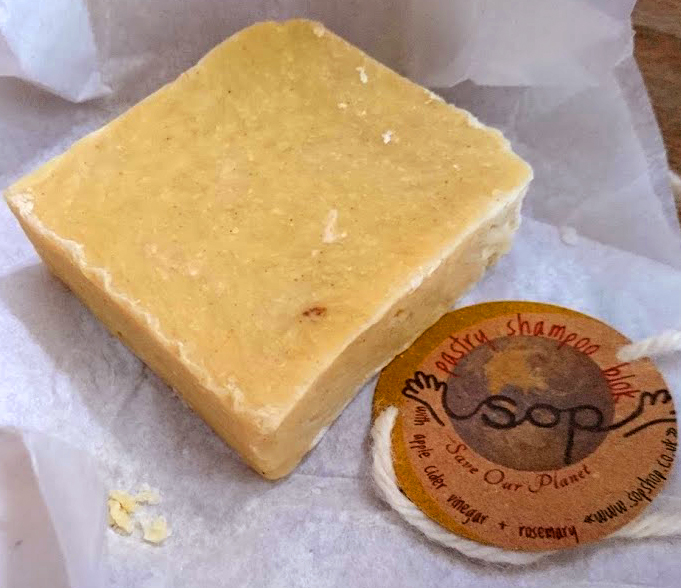
I had a minor epiphany recently; a noticing. Of the sort where it now seems so blindingly obvious, I can’t understand why I didn’t notice it before. And now I can’t stop noticing it, and the way it informs so much of our thinking as a society and, moreover, the huge problems it causes.
The thing I noticed is this: we have become slaves to product-based thinking. Well, what I really noticed first was that I have, but on further reflection I’m pretty sure it’s not just me.
Back in August, as part of a general drive to reduce the amount of plastic I use, I began washing my hair with a shampoo bar (instead of my usual brand in a plastic bottle). It took a little bit of adjustment, but I’m now a total convert. Buoyed by this success, I started converting other products over to lower waste alternatives. I stopped using shower gel, and used soap. Instead of fabric softener, I put vinegar (bought in bulk or glass jars) in the wash. Bicarbonate of soda (which I can fill a jar with cheaply at my local zero waste shop) and vinegar work for all sorts of cleaning purposes. I was on a roll.
I googled “make your own shaving cream” and started looking into various recipes when a phrase in one of them made me sit up. It said something like: “of course, you can really use a mix of anything that will lubricate the skin and protect it from the razor” and I thought: Huh, like, er, soap? And yep, turns out soap works totally fine (duh). The answer had been staring me in the face all along.
Maybe you can see where I’m going here. But I couldn’t, for a long time, until that moment when I started thinking about the properties I needed for a shaving cream to work, and then felt like an idiot for even needing to google it. But I googled it because so pervasive is the assumption I needed particular products in my life, that it hadn’t even occurred to me to think more laterally. My previous mindset, deeply entrenched, was that I absolutely had to have a separate shower gel, a shaving gel, a shampoo, a conditioner, a facial wash, etc etc. But I didn’t. I needed things with the following properties: will clean my skin, will help me shave (arguably, not something I need either but that’s another debate), will clean my hair. Plain old soap works fine for most of these things (for me, your mileage may, of course, vary).
This is not just true of beauty products. A cake recipe says I need to add an egg, but what it really means is something with binding properties and to help it rise. I can do that with apple sauce (or chia seeds) and baking powder (and yes, this works). Do you need a specific hammer for that DIY job? Or will anything hard and flat that you can hold do, really?
As someone who works as a digital producer (/product owner/manager/whatever), I often find myself railing against the “we need an app” mentality. Or even, as much as I love games, the “we need a game to change behaviour in this area!” mentality. Sometimes as a consultant I will find myself saying, well, let’s go back to your objectives here, it seems what you really want to do doesn’t really require a game at all, and a simpler low-tech approach might be better and easier (like, maybe downloadable resources for schools, or, er, a book). In these situations I am very comfortable with thinking laterally about what solution might have the necessary properties to meet the objectives. So it seems odd that I rarely applied those same principles to the rest of my life.
But the thing is, this type of thinking is now deeply embedded in our culture, because products make our capitalist world go round. We’ve been sold the idea that we can’t just use soap for a variety of purposes, because if there is only one product to sell us (and it’s a simple, cheap one) then there is less money to be made. We’ve been sold the idea that everything should be an app, or use a new piece of hardware, not because we actually need it, but because that’s what makes money. Forget the old stuff you bought, this new stuff will fix your problems!
This is actually dangerous. This technological product-based thinking is driving societal change at a rate that is outstripping policy and safeguards to deal with the new challenges it poses. It is filling our oceans with plastic, using up precious resources, distracting our brains with concerns about which product to use – which one is moisturising, which is cleansing, which one gives off the right social signals – instead of all the more useful activities we could be putting our energies towards. This is infantilising, too, discouraging us from thinking for ourselves and testing things and building personal experience to find the best option (maybe one soap is too drying, does it help to try one that has olive oil in it? This ratio of vinegar to soap in my cleaning solution isn’t working so well, let’s adjust it).
So now I’m thinking, what does the world look like if we go back to first principles? If we think in terms of properties, not end products? What do we really need and what can we replace with, well, vinegar and bicarb, or soap? Does it have to be VR, or could it work with the technology that most people already have? It might mean a little compromise, but are the marginal gains to be found in the new and improved version really worth it?
(Who is doing this property-based thinking well? I’d love to hear any examples, please share!)
